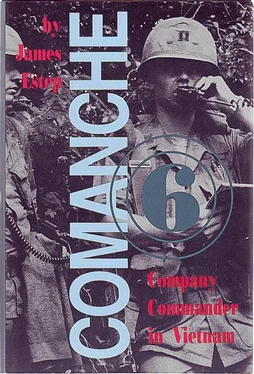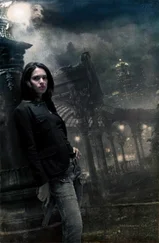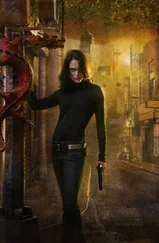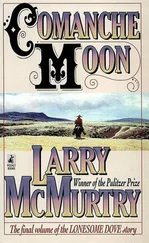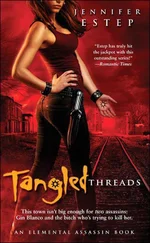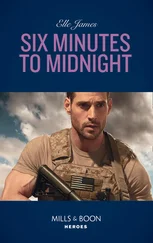And I suppose he had.
After giving me a shot of morphine, which did absolutely nothing to relieve the pain, he pulled my right leg straight and tied it to my left leg. As he was filling out a casualty card, I asked, “How about it, Doc? Will I be coming back?”
He shook his head. “Sir, you know better than that.”
Arizona Six landed moments later with a new captain at his side. My replacement? Colonel Lich and I talked briefly, the two of us agreeing that it was best to hit Charlie hard with artillery before sending the company back in. I told him he must get new leadership to 1st Platoon quickly, before they began feeling sorry for themselves. He said he would. After a short and somewhat awkward lull, he told me I mustn’t worry about the company; I’d be back. But he also knew better than that.
Then, looking up, I saw the Bull kneeling beside me. He was smiling but had concern in his eyes. “Like I say, Six, sometimes you eat the bear, and sometimes the bear eats you.”
“I’ll be back, Top,” I said, forcing a smile. “Just hold it together till I get back.”
He looked at my leg, shook his head, and said, “No, you won’t be back, sir. And we’ll miss you; company will miss YOU.”
Seeing the dust-off Huey coming in on final, he got to his feet. Looking down at me, he said, “Good luck, Six. See you in the world.”
I was loaded aboard the Huey, and we took off. The helicopter gained altitude quickly and then, banking sharply to the left, overflew the company’s perimeter on its way back to Evans. From atop my stretcher, I was able to look over my shoulder and see the men of Charlie Company digging their defenses on the edge of Xom Dong My.
I’ll miss you so very much.
23. Tour’s End: 9 March 1968
As I was taken from the helicopter and rushed into the Cav’s forward evacuation station at Evans, I noticed that the sun was still shining. It was a beautiful day. Everyone began working on me at once. Someone removed my left boot, while others cut away my uniform and right boot.
Suddenly I was naked, filthy, and covered with leeches. These were quickly removed.
Meanwhile, someone inserted an IV in my right arm, while others straightened my leg—a dreadfully painful experience—cleaned it, stuffed some gauze in the open wound, and then splinted it with wire and ace bandages.
Throughout this ordeal, yet another party kept asking me questions.
“Name and rank?”
“Estep, James L., Captain.”
“Service number?”
“05322246”
“Unit… next of kin… home of record.” And so forth.
After giving me a general wipe down to remove most of the mud, they gave me another shot of morphine, covered my nakedness with a blanket, wrote up what they had done, and put me back on the helicopter.
It had all taken less than twenty minutes.
My next stop was one of the Corps’ evacuation hospitals, a major medical facility located at Hue-Phu Bai. Here things did not go nearly as quickly as they had at Camp Evans. After being hurriedly transported from my Huey into a spacious warehouselike structure, I was placed on a concrete floor—and left there.
It was a dark, dreary place, but there was still enough light to see that I was not alone. Stretchers such as mine, with wounded soldiers atop them, literally covered the building’s floor. Many of the men were in pain. Some of them moaned, a few called for their mothers or divine intervention, while one simply screamed over and over. There was one other who loudly cursed everything and everyone imaginable.
Taken together, these many expressions of pain produced an eerie, morbid “oversound” that Hollywood could never recreate in its most macabre horror films. I didn’t like it. I missed the security of my company. I missed sitting atop my mermite and discussing the state of the command with the Bull.
The hours passed. Oh, how my leg hurt! The pain began coming in waves, the crests of which brought tears to my eyes. Occasionally a medic would check my wound and vital signs.
“How’s it going, buddy?”
“I’m in pain. Lots of pain.”
“Sorry, buddy, can’t give you anything yet. Too soon. Hang in there.”
Don’t call me “buddy,” goddamn it! I’m a captain, captain of infantry, queen of battle! Address me as “sir.”
But he had already left.
They continued to hurry stretchers out one end of the building, while bringing them in the other just as quickly.
I know what we have here, I thought to myself, remembering my Special Forces training. This is the triage process, the process of determining priority of treatment when confronted with mass casualties. Those with life-threatening wounds, but who can be saved, go first. Serious but non-life-threatening wounds are treated next. Those so seriously wounded that treatment would probably be of no avail—well, you put them in the corner and call the chaplain. This is a good sign! I’m not in a corner, and I’m obviously not being treated as first priority in their sorting process.
Sometime later the medical attendant returned.
“How’s it going, buddy?”
“Are you gonna give me a shot?” I asked. You can call me buddy if you’ll give me a shot.
“Yes, but only if you feel you really need it.”
You pompous sonofabitch! Who made you keeper of Uncle Sam’s medicine chest?
“Yes, I really need it, goddamn it! And if you call me buddy again, if you don’t address me as sir, I’m gonna have you up on charges!”
I must have drifted off for a short while. Suddenly, I awoke to find myself being moved. It was my turn. Lifting me from the stretcher, they placed me on a gurney and wheeled me through the double swinging doors at the end of our “warehouse.” The next room was a brightly lit operating facility, a large one composed of several cubicles. I was wheeled into one of them.
“Okay, what do we have here?” someone asked.
“High-velocity gunshot wound, lower right leg. Compound fracture, tibia-fibula. He’s stable,” someone else replied.
Stable, my ass. I’ve never been so unstable in my entire fucking life.
“Roll him on his side. We can handle this with a spinal,” the first party replied.
As they rolled me over on my side, a third party said, “This won’t hurt at all, and it’ll take the pain completely away.”
He, or she, was 100 percent correct. It didn’t hurt, and, like magic, the pain disappeared! For the first time in the six to eight hours since Moseley had pulled me over that paddy dike, my leg didn’t hurt. I felt absolutely nothing from the waist down. Now, with the pain gone, I could feel the effects of the morphine, or Demerol, or whatever I was shot up with—and it felt good.
All right, Doc, let’s get on with this operation. Piece of cake! Like we say in the Cav, “Ain’t no big thing.”
A bit fuzzily, almost mindlessly, I watched as they did a quick prep and then went to work trying to clean up the mess Charlie had made of my leg. A modern high-velocity projectile, regardless of its caliber, destroys a lot of tissue as it passes through the human body.
An AK-47 round is no exception. Hence, the team’s first order of business was the debridement, or removal, of this dead meat, which they accomplished quickly and efficiently. A drain was then inserted in the open wound, the wound sutured around it, and the leg set and plastered around the drain. Then I was whisked away as one of the surgical team yelled, “Next!”
Later that night or early the following morning, when the effects of the spinal had worn off, I awoke in one of Hue-Phu Bai’s holding wards to find the searing pain once again attacking me in throbbing waves. A nurse gave me a shot and a sleeping pill, and I drifted off for another couple of hours. This was the first night of a sleep, wake, pain, wait, shot, pill, sleep again ritual that would be part of all my nights for weeks, indeed months, to come.
Читать дальше
